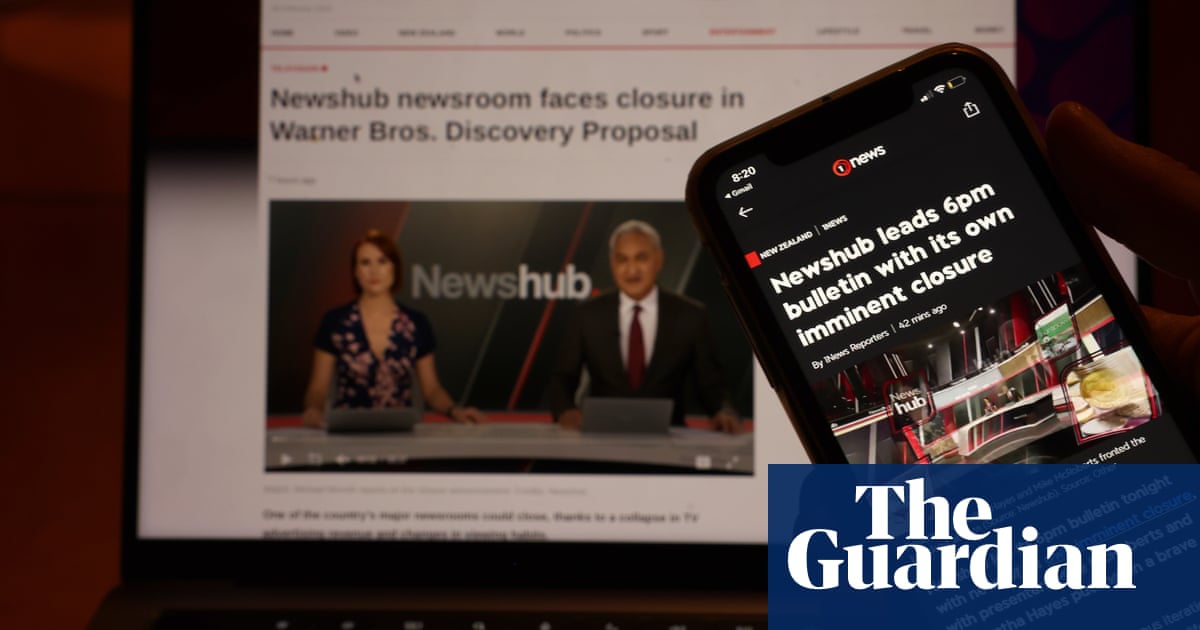New Zealand’s news media has been dealt a major blow after two of its primary news outlets announced programme closures and hundreds of job losses between them on the same day, leaving the country with just one state-owned news television service and many senior journalists out of work.
On Wednesday morning, Warner Bros. Discovery confirmed it would close all its Newshub news operations, including the news website, the morning television show and the 6pm television bulletin, resulting in roughly 300 job losses.
By the afternoon TVNZ – the state-owned television broadcaster – had confirmed it would axe its long-running current affairs programme Sunday, consumer affairs programme Fair Go, and stop its midday and late-night bulletins, resulting in the loss of another 68 media roles.
As colleagues wiped away tears behind him, Newshub investigative reporter Michael Morrah said the announcement was devastating for himself, his colleagues and “New Zealand as a whole”.
“Newshub acted to better society, and it’s a huge blow for democracy and a huge blow for the country,” he said.
The president of Warner Bros. Discovery, Asia Pacific, James Gibbons, said when the company announced the proposed Newshub restructure six weeks ago, it explained to staff “there was nothing anyone in our New Zealand networks business could have done better”.
“It was a combination of very strong economic headwinds both in New Zealand and the global market. As we said at the time, the downturn has been severe, and the bounce-back has not materialised as expected.”
Gibbons said in 2023, $74m of broadcast TV advertising disappeared in New Zealand. “Apart from 2009, the year following the global financial crisis, this was the single largest year-on-year drop in 30 years – a 14.3% drop,” he said.
Warner Bros. Discovery will continue to provide local programming with a focus on drama, comedy, sport, reality and factual content.
Newshub’s closure means the country is left with just one English television news service, the now pared back state-owned TVNZ.
In an email to staff, TVNZ’s chief executive, Jodi O’Donnell, said cancelling Sunday, which has been running for 22 years and is responsible for agenda-setting investigations, was not an easy decision, but that the future of TVNZ needed to be secured.
TVNZ hoped to establish a team with a focus on long-form current and consumer affairs for TVNZ’s digital platforms, she said. “I am confident in our future, and in our ability to continue to deliver on our purpose of inspiring the conversations of Aotearoa.”
In March, O’Donnell said “tough economic conditions and structural challenges within the media sector” had hit the company’s revenue.
On Tuesday, the minister for broadcasting, Melissa Lee, said that TVNZ’s job cuts were “very upsetting” for staff, and while she was working towards a solution, there was no easy fix. “I’m not a magician and I’m trying to find a solution to modernise the industry … there is a process happening,” she said.
The shrinking news landscape spells “terrible news” for the media and “desperate times for our democracy”, said Greg Treadwell, a senior journalism lecturer at Auckland University of Technology (AUT).
“This is like going back to the 1970s for our democracy, where the plurality of voices was incredibly restricted and dominated by dominant cultural voices,” he said.
While the cutbacks are shocking, they are not surprising, Treadwell said.
Treadwell said the country needed to start looking at the media industry crisis as a societal issue, not just a market problem. On Tuesday, AUT released its annual report that investigates public trust in New Zealand media. It found that trust in news media continues to decline, with almost all major news outlets suffering drops in their trust ratings.
The report noted that those who do not trust the news, or avoid it, do so due to concerns over its negativity, the impact that it has on their mental health, and what they perceive as “political bias and opinion masquerading as news”.
“We’ve got to work out a way we can restore the balance in our news environment,” said Treadwell, who co-wrote the report. “We need people at the same table even if we disagree – and the current news media environment risks political splintering of the community.”

